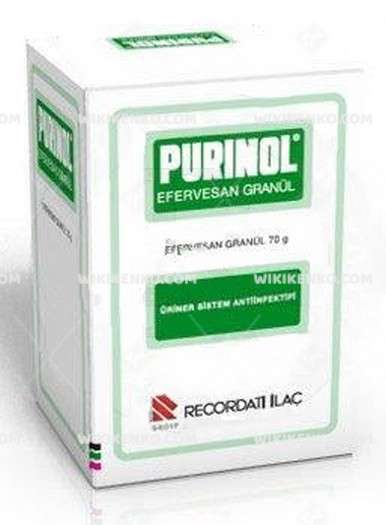Purinol Efervesan Granul
Purinol Efervesan Granul is a urinary antibacterial agent that is effective against both gram-negative and gram-positive organisms. It is used for both treatment and prevention of urinary system infections.
| Dosage form | |
|---|---|
| Pack size | |
| Potency | 500 Mg 70G |
| Manufacturer | |
| Origin | |
| Generic Name (Ingredient) | For A Scale (5 Grams) Methenamine 250 Mg Metenamine Anhydromethylensitrate 615 Mg |
Assuming your emergency circumstances for this product, visit Urgent Quotation page. Besides, for any pharmaceutical questions, please ask us in the comments section.
Description
Composition
Each 5-gram sachet of Purinol Efervesan Granul contains 250 mg of methenamine and 615 mg of methenamine anhydromethylene citrate as active ingredients. The excipients include Povidone K30, Sucrose, Sodium bicarbonate, and Tartaric acid.
Indications
Purinol Efervesan Granul is indicated for:
Treatment of acute infections after successful initial treatment with antibiotics.
Prevention of recurrent cystitis (bladder inflammation) as long-term treatment.
Prevention of the progression of urinary tract infections in patients with permanent catheters and reduction of catheter blockage cases.
Prevention of infections that may occur during device interventions on the urinary tract.
Asymptomatic bacteriuria (presence of bacteria in the urine).
Contraindications
Purinol Efervesan Granul should not be used if you:
Are allergic to methenamine or any other component of Purinol Efervesan Granul.
Are taking sulfonamide antibiotics (concomitant use with Purinol can damage the kidneys).
Are severely dehydrated.
Have serious kidney problems.
Have liver problems.
Have gout.
Have metabolic acidosis (a chemical imbalance in the blood).
Precautions
Use Purinol Efervesan Granul with caution if you have any kidney problems.
Use the form below to report an error
Please answer the questions as thoroughly and accurately as possible. Your answers will help us better understand what kind of mistakes happen, why and where they happen, and in the end the purpose is to build a better archive to guide researchers and professionals around the world.
The information on this page is not intended to be a substitute for professional medical advice, diagnosis, or treatment. always seek the advice for your physician or another qualified health provider with any questions you may have regarding a medical condition. Always remember to
- Ask your own doctor for medical advice.
- Names, brands, and dosage may differ between countries.
- When not feeling well, or experiencing side effects always contact your own doctor.
Cyberchondria
The truth is that when we’re sick, or worried about getting sick, the internet won’t help.
According to Wikipedia, cyberchondria is a mental disorder consisting in the desire to independently make a diagnosis based on the symptoms of diseases described on Internet sites.
Why you can't look for symptoms on the Internet
If diagnoses could be made simply from a textbook or an article on a website, we would all be doctors and treat ourselves. Nothing can replace the experience and knowledge of specially trained people. As in any field, in medicine there are unscrupulous specialists, differences of opinion, inaccurate diagnoses and incorrect test results.



Reviews
There are no reviews yet.